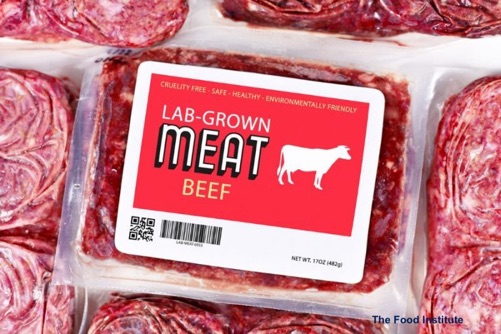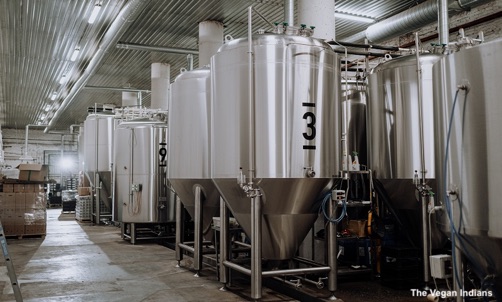News
25 April 2022
Synthetic biology: solution or dangerous delusion?
Animal products, natural resources and climate
Regular readers of hungerexplained.org have had earlier opportunities to find out that food of animal origin (particularly when it comes from intensive industrial production units) required a lot of natural resources and had a negative impact on the climate [see for instance here or here] and on animal welfare [read]. Similarly, technologies used and excessive consumption of animal products can have adverse effects on health [read here and here].
Solutions suggested to these problems frequently involve the reduction of consumption of food of animal origin and its limitation to items produced in a way compatible with the protection of the climate and of the environment. They are often put forward by civil society organizations.
Recently, however, the industry became interested by this issue, and it is now proposing a new “solution”.
Synthetic biology and its fabulous promises
The development of synthetic biology has led to precision fermentation that makes it possible to programme micro-organisms for producing almost any complex organic molecule, including growth factors for the production of meat by cells rather than by animals. This is what some have been calling “Food as Software”.

In less than 20 years, the cost of producing a single molecule by precision fermentation has fallen sharply from $1 million/kg in 2000 to about $100/kg in 2019, and advocates of this type of technology say that it is 10 times more efficient than a cow at converting feed into end products (10 times less water, 5 times less energy and 100 times less land) [read].
According to the San Francisco-based Rethinkx think tank, the world is likely to be at the eve of a revolution that will shake up the livestock sector and that will have considerable implications for society as a whole. Rethinkx projects that the cost of production of proteins could fall by 80% by 2030, and by 90% by 2035, and it claims that future “food products will be higher quality and cost less than half as much to produce as the animal-derived products they replace.” It also believes that, in the future, new molecules created by scientists would be uploaded to databases that food engineers anywhere in the world would use to design new products in the same way that software developers design a new application [read].
The consequence of such a revolution would, among other things, according to Rethinkx specialists, include a dramatic fall of the price of food of animal origin, a reduced food budget for households, a better quality diet, a lower price of land, more forests, energy savings, fewer GHG emissions and the creation of industrial jobs. In a nutshell, almost everything that is needed to make a better world!
In France, Agriculture Cellulaire France - an association supported by FoodTech, a network of startups, private companies and public actors - promotes and advocates for this new agriculture with the stated objective of contributing “to the resolution of problems associated with industrial livestock production” and help the development of “animal products with less impact on the environment, our health and animals”.
The other side of the coin (or of the loin)
The latest IPES-Food report (The politics of protein) sends a chill to those believing with promises made by the proponents of synthetic biology applied to food, by noting that it is precisely those who are primarily responsible for the non-sustainability of our food systems (large industrial and commercial companies) who are the prime promoters of this new activity.
The report also emphasizes that the solution put forward by the advocates of cell-meat is the answer to the wrong questions, and it decrypts the narrative of the lobbyists supporting it, stressing the false issues it raises and the biases that characterize it. In particular, it explains that the arguments that the proponents of these new technologies use, often neglect key issues and the complexity of the food problem.
Here are some of the points made by the report:
-
1.Overemphasis on protein, while it is well known that proteins are only one among the many nutrients needed for undernourished people, and that all proteins required for a healthy diet can be found in plant-based products.
-
2.Sustainability reduced to GHGs and climate only, when it should involve all natural resources, biodiversity, water pollution and soil degradation, among others.
-
3.Failure to consider the diversity of the ways in which food is being produced, their social and economic function, and of the conditions prevailing in different regions of the world.
-
4.Failure to consider complexities, path dependencies and power dynamics (and failure to consider the food system as a complex whole).
The IPES-Food publication sees very clearly who is backing the development of “alternative proteins”. They are protein industries, some vegetarian or vegan organizations, animal welfare groups, investors (particularly meat processors), influencers and some specialised media.
The main argument they use is that of the negative impact of food of animal origin on the environment, health and animal welfare. The solution proposed is the partial or complete replacement of animal source foods with plant-based substitutes or lab-grown meat.
In doing this, their narrative completely neglects the fact that animal production is the work and source of livelihood of a very large number of producers and that the substitution of livestock products would modify fundamentally power relations and have a tremendous impact on the global food system as a whole, with consequences that have not been evaluated quantitatively or qualitatively. Moreover, it totally omits to consider systemic solutions, some of which have been described on hungerexplained.org [read in particular here and here].
Indeed, alternative proteins are part of an array of solutions (such as, for instance, the digital revolution [read]) that are grounded on the mistaken notion that food issues could be easily fixed by science and technology.

This techno-economic approach, endorsed by private businesses that see it as a potential source of immense profits, entirely ignores the human and systemic dimension of global food, which for them probably appears to be a useless and irritating complexity that hampers the occurrence of the change they wish.
The authors of the IPES-Food report believe that if these solutions were applied on a large scale, they would for sure worsen the problems of the industrial food system (more dependence on fossil fuel, monoculture, pollution, poor working conditions, unhealthy diets and the power of big agri-food corporations).
On the eve of the Food Systems Summit, there had been some fear that this technicist approach might prevail in the future. The large private corporation’s failure to take control over the global food system and its governance, in 2021 [read], keeps alight the hope to see holistic solutions implemented that take account of consumption as well as of production, of producers as well as of consumers, and of all the dimensions of sustainability, before it is too late [read here, here and here].
—————————————
To know more :
-
•IPES-Food, The politics of protein: examining claims about livestock, fish, ‘alternative proteins’ and sustainability, 2022.
-
•Tubb, C. et Seba, T., 2030: The second domestication of plants and animals, the disruption of the cow, and the collapse of industrial livestock farming. Industrial BiotechnologyVol. 17, No. 2, 2021.
Selection of past articles on hungerexplained.org related to the topic:
-
•Opinions : Rethinking Food and Agriculture – New Ways Forward, a review by Andrew MacMillan, 2021.
-
•To manage sustainably our water resources, we need to change our food consumption, 2019.
-
•Policies for a transition towards more sustainable and climate friendly food systems, 2018.
-
•Animal welfare: a cause that makes progress thanks to civil society, 2018.
-
•Le vrai coût de notre alimentation : le cas du lait, 2017 (in French).
-
•Opinions: Catastrophic Antibiotic Threat from Food, by Jomo Kwame Sundaram and Tan Zhai Gen, 2017.
Last update: April 2022
For your comments and reactions: hungerexpl@gmail.com


